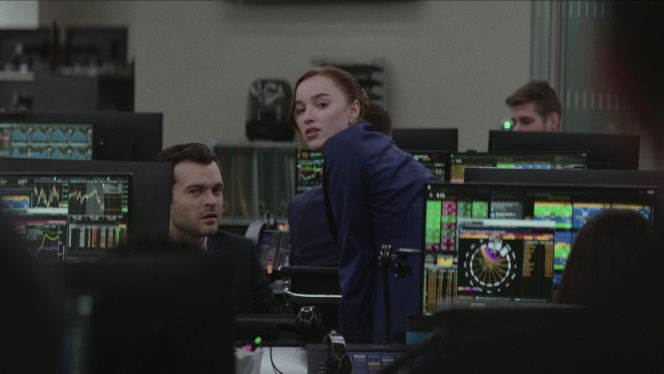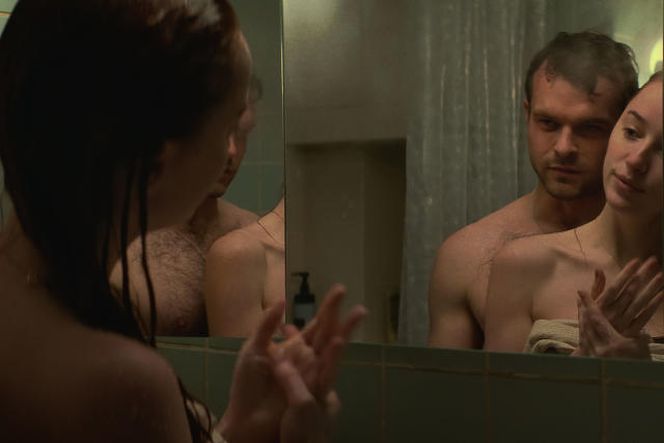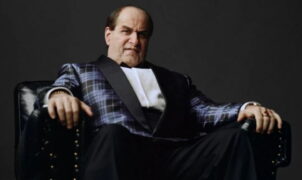MOVIE REVIEW – At first glance, Netflix’s Fair Play seems like a mediocre erotic drama about a financial power couple who keep their engagement a secret. However, as the story settles into the chilling realities of the financial world, the suspenseful thriller nature of the story emerges. Writer-director Chloe Domont’s debut feature at times struggles with its own ambition and dramatic charge, but ultimately reveals a gripping and haunting story about the lives of a young couple in love who work in the financial sector.
The film introduces us to Luke (Alden Ehrenreich) and Emily (Phoebe Dynevor) during a family wedding, in a humorous and intimate sequence that includes oral sex, menstrual bleeding and an unexpected marriage proposal. This part of the movie gives the couple’s relationship a surprisingly sweet and intimate start, despite being set in a public restroom. Although the movie doesn’t fully develop the couple’s sexual dynamics on the level of their greedy passion, it is humorous and charming enough to captivate the viewer as a young couple in love spends their first night together. This sequence, though unintentional, sets up an amusing contrast between the couple’s usual work routine and their engagement, which has the effect of an ice-cold shower. Separately, they leave their cramped New York apartment in the early hours of the morning to meet at the offices of the same cutthroat hedge fund, where they both work as analysts, trading different stocks and taking short positions while maintaining a professional attitude toward each other.stocks and taking short positions while maintaining a professional attitude towards each other.
Bruised egos, jealousies
When a long-awaited position (with its own office) opens up, Luke’s name is the first to be mentioned as the next possible candidate. But when Emily is invited to a late-night meeting with her stern boss Campbell (played by the formidable Eddie Marsan), she is eventually offered the job instead of Luke. Naturally, this development comes as a surprise to both of them, and although Luke tries to be supportive of his partner despite his obvious disappointment, cracks soon appear in their relationship. The problems are exacerbated by their inability to adequately express their concerns and Luke’s inability to control his bruised ego now that he is working directly under Emily’s direction.
There are long stretches in the first half of the 115-minute movie when Domont and cinematographer Menno Mans don’t seem to know where to point the camera in the quieter moments. The framing moves purposefully, as if only to reveal nothing from the periphery of the characters. It’s strange and distracting, bordering on amateurish – until the action suddenly accelerates, leaving little time or space for meandering. As the couple’s personal and professional lives collide, the mutual resentment grows and eventually takes a surprising form: as much a family drama as a workplace thriller, with often millions of dollars at stake, Fair Play is a family drama. The movie doesn’t go into enough financial detail, but it does place every decision in the dramatic context of the inevitable clash between the couple’s public and private lives, and their secret relationship that constantly threatens their careers.
A woman’s walk in a man’s world
Dynevor adapts brilliantly to her role as she moves in the right circles, sometimes seducing, sometimes hitting back hard at an overly pushy colleague, sometimes fearfully navigating the male-dominated ladder of Wall Street. The movie is largely aware of the toxic effects of macho culture in this financial environment – without being annoyingly feminist or woke. However, the movie’s progress is sometimes slowed by the relatively straightforward approach of Emily, whose life is largely determined by external factors: her relationships, her job, her bosses, and so on. On the one hand, this is a sly commentary on the way women navigate the male-dominated corporate world, but the dramatic framing of the character often feels incomplete. While the woman’s interiority is revealed in a cinematic way – her glances and cuts reveal who and what she is looking at – Emily’s close-ups rarely reveal anything about who she really is beneath the surface.
Neither Luke nor Emily seem to have any opinions, interests, or perspectives outside of their work and each other, though this could be interpreted as a self-reflexive commentary on the corporate merry-go-round. Rather, the highlight of the movie is the way Domont coaches Ehrenreich as an actor, shaping and molding his character. His portrayal of Luke, quietly tormenting himself, is brilliant, creating a palpable tension that gradually and increasingly weighs on Luke and Emily’s relationship, which neither can adequately put into words. He’s a ticking dramatic time bomb that’s building to the point of explosion, and the way the camera shows Ehrenreich’s performance as it slowly but surely reaches that explosive level is itself thrilling and maddening. This feeling is heightened by the film’s masterful sound design, which renders every everyday environment as an irritant, whether it’s a conversation at work or the simple movement of a romantic partner around the house.
The words are weapons
Perhaps the most exciting thing about Everything Outdoors is the way it turns words into weapons, giving both protagonists the opportunity to think through every exchange and react in all the wrong ways. It’s a shockingly disarming, vivid portrayal of a relationship on the brink of collapse, including the way the power dynamics in the bedroom are blurred by the lack of communication. Though it ends in a place that is perhaps too morally didactic for an otherwise disorderly and complex film, Fair Play stands out as one of those rare modern Hollywood thrillers where the stakes are entirely personal, thanks to a masterful sense of escalation from a first-time director whose work is likely worth watching.
With a pair of riveting performances at its center – especially Alden Ehrenreich’s transformation from wounded man to evil beast – Chloe Domont’s Fair Play transcends its shortcomings to become one of the most exciting directorial debuts of the year. Few Hollywood genre films are able to so honestly capture the causes of relationship breakdown, and even fewer are able to so deftly turn that breakdown into a razor-sharp corporate drama.
-BadSector-
Fair Play
Direction - 8.2
Actors - 8.4
Story - 8.2
Visuals/Music/Sounds - 7.8
Ambience - 8.2
8.2
EXCELLENT
Fair Play explores the drama of two young financial analysts struggling to make ends meet amidst professional advancement and personal conflict. The film also functions as a suspense thriller, exploring the complex dynamics of personal and professional relationships and the dangers inherent in the financial sector. Director Chloe Domont's debut feature offers a sharp drama of outstanding performances and the personal and professional challenges faced by those working in the financial sector, with a focus on communication and interpersonal relationships.


















Leave a Reply